James L. Thane's Blog, page 12
March 14, 2019
A Wine Merchant Gets Caught Up in an Investigation of Fraudulent Wines and Spirits in This Novel from Dick Francis
 This is one of the better novels from Dick Francis. Like a few of the others in the series, this one is only loosely set in the world of horseracing, and the protagonist, Tony Beach, is not a jockey but rather a wine merchant. He owns a small shop and has spent the last six months grieving for his wife who built up the shop with him and then died of an aneurysm while six months pregnant.
This is one of the better novels from Dick Francis. Like a few of the others in the series, this one is only loosely set in the world of horseracing, and the protagonist, Tony Beach, is not a jockey but rather a wine merchant. He owns a small shop and has spent the last six months grieving for his wife who built up the shop with him and then died of an aneurysm while six months pregnant.Beach is simply going through the motions of living, opening his store, dealing with customers and occasionally supplying the liquor for various parties. On a Sunday afternoon, he's catering the liquor for a party thrown by a successful horse trainer. A lot of important guests have gathered for the event, which is being held in a large tent on the grounds of the trainer's home.
As the party gets under way, the trainer's principal assistant approaches Beach with a problem. One of the owners who has several horses with the trainer also owns a restaurant. The trainer and his assistant had dinner there recently as guests of the restaurant owner. The assistant is concerned because he believes that someone is fiddling with the liquor served at the restaurant. The man ordered an expensive Scotch whisky after dinner, but was served something decidedly inferior that had apparently been substituted for the whisky that was supposed to be in the bottle.
The assistant fears that someone may be cheating the restaurant owner, and he asks Beach if he would be willing to go to the restaurant and order the whisky to confirm his suspicions. Then he can delicately approach the owner and inform him of the problem. However, as they are discussing the matter, a horse van breaks loose, apparently accidentally, rolls down a long hill, and smashes into the tent where the party is being held, killing a few guests and injuring others. Among the dead is the restaurant owner.
Beach now finds himself assisting a firm of investigators, and the police as well, in a wide-ranging investigation involving mislabeled wine and spirits. It turns out to be a very dangerous assignment, given that there are some powerful adversaries who will stop at nothing to protect the racket they've perfected.
Readers will recognize Tony Beach as a typical Francis protagonist--apparently quiet and unassuming, but underneath the mild exterior, a man who is smart and tough as nails when the going gets rough. The plot moves along well, and the details of the liquor business that one picks up along the way are interesting too. All in all, a pleasant way to spend an evening.
Published on March 14, 2019 15:38
March 12, 2019
Psychologist Alex Delaware and Detective MIlo Sturgis Take on Another Very Strange Case
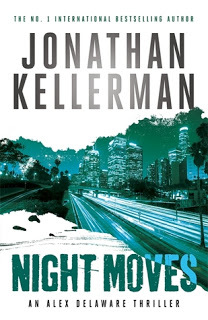 As the thirty-third Alex Delaware novel opens, a very dysfunctional L.A. family of four returns from a Sunday night dinner out to find a murder victim left in the family's den. The victim's face has been blown away by a shotgun and his hands have been cut off. He's obviously been killed somewhere else and left here, but why?
As the thirty-third Alex Delaware novel opens, a very dysfunctional L.A. family of four returns from a Sunday night dinner out to find a murder victim left in the family's den. The victim's face has been blown away by a shotgun and his hands have been cut off. He's obviously been killed somewhere else and left here, but why?Homicide Detective Milo Sturgis is totally flummoxed and so does what he always seems do do with every even remotely complicated case that he sees: he dials up his buddy, psychologist Alex Delaware, in the hope that Alex can sort things out for him. Alex races to the scene and begins offering his thoughts.
The family members all swear that that have no idea who the victim might be or why he would have been left in their den. This is hardly surprising since, given that the victim has no face and no hands that might be fingerprinted, nobody at this point has the slightest idea who he might have been or why he would have been left in that spot.
The father is a total blow-hard; the mother is a pain in the butt; the teen-age son is a complete jerk, and the daughter is just plain weird. Alex will have his hands full trying to figure these guys out, but they all claim that no one could be angry enough with them to have done something like this in their home.
This is a fairly wealthy and insular neighborhood, and the canvas turns up a very strange neighbor who everyone thinks might be a great suspect, mostly just because there are no other obvious suspects in sight. But the guy refuses even to talk to the police or to Alex and so they spend a lot of time spinning their wheels. Other suspects will emerge; another victim will be murdered, and Alex and Milo will try to get it all sorted out. To be honest, though, I have to say that I barely cared whether they did or not.
With apologies to anyone who has read my reviews of the last few books in this series, I will repeat what I've said before: I absolutely loved the first few books in this series. Alex Delaware was a great new protagonist and--most importantly--in the early books there were actually legitimate reasons for him to be involved in these investigations. He was a consulting police psychologist and the police used him in cases where his expertise was genuinely needed.
In many of the recent books though, the notion that Delaware would be seriously working as a psychological consultant has gone out the window to a very large extent. Milo invites Delaware to participate in practically every investigation that comes his way, irrespective of whether there's a legitimate need or not. This book is a good example.
Given the screwy nature of several of the characters in this novel, somewhere down the line Milo might have asked Delaware to provide some insight, but there's no legitimate reason to be dragging him into the case even before the criminologists have left the scene of the crime. A man's been murdered by a shotgun blast--like no one's ever seen this before, and like any reasonably intelligent homicide detective would need to call in a psychologist at this point?
As the novel progresses, Alex will offer the occasional psychological observations, most of which are no more sophisticated than those that might have been offered by anyone who's taken Psych 101. Frankly, the author seems to have gotten to the point where he often doesn't even make much of a pretext that Delaware's skills as a psychologist are essential to the story. Clearly, he just exists at this point to be Milo's Best Bud and to help him solve the crimes that come his way.
If Delaware were another homicide detective, rather than a psychologist, it would make sense for him to be heavily involved in this case and the story would make for a reasonably decent novel. But he isn't, and it doesn't. And as someone who's been reading this series from the beginning and who remembers how great it once was, I find myself increasingly frustrated and disappointed with what it's become.
Published on March 12, 2019 16:14
March 7, 2019
Another Excellent Entry in the Sean Duffy Series by Adrian McKinty
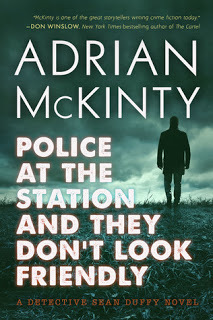 The sixth novel in Adrian McKinty's excellent series featuring Detective Sergeant Sean Duffy of the Belfast, Northern Ireland police force is set in 1988. It begins with an ominous prologue in which three masked gunman march Duffy deep into the woods, hand him a shovel, and order him to begin digging his own grave--not exactly the moment that a fan of the series would be anxious to see.
The sixth novel in Adrian McKinty's excellent series featuring Detective Sergeant Sean Duffy of the Belfast, Northern Ireland police force is set in 1988. It begins with an ominous prologue in which three masked gunman march Duffy deep into the woods, hand him a shovel, and order him to begin digging his own grave--not exactly the moment that a fan of the series would be anxious to see.With that setup in place, the story backs up to find Duffy on a brief visit to his parents with his girlfriend and their baby daughter. The visit is interrupted when Duffy is summoned back to the scene of a particularly odd homicide. Someone had shot and killed a drug dealer in front of his house, using a bolt fired from a crossbow. This is still the time of the "Troubles" in Northern Ireland, and the dead man's neighbors are not at all anxious to assist the police with the investigation. The murdered man's wife claims that she was asleep in the house and knows nothing at all about what happened.
It's possible that the man was killed by a group of vigilantes (actually a faction of the IRA) who have been targeting drug dealers. There are any number of other possibilities, of course, and Duffy and his team will do their best against very long odds to identify the killer and bring him or her to justice. Politics inside the department will also interfere with the investigation. Duffy, who has always followed his own instincts, has made some powerful enemies with in the department and, unfortunately, a reorganization is underway which will bring some of Duffy's worst enemies into positions of authority over him.
I've been a fan of this series since the first book, The Cold Cold Ground, and like the other five, this one is a great read. Sean Duffy is one of the freshest and most intriguing crime fiction characters to come along in quite a while, and it's always a lot of fun to follow in his footsteps. The plot is very well constructed and, as always, McKinty excels at describing the setting in Northern Ireland. McKinty was born and raised in Carrickfergus, where Duffy is stationed and clearly he knows the area, the people, and the politics exceptionally well.
As with all the other books in this series, the title comes from a song by Tom Waits, in this case one called "Cold Water," which, like a lot of Tom Waits songs, has an interesting story of its own behind it.
Published on March 07, 2019 14:16
March 5, 2019
Reporter Jack McMorrow Gets More Than He Bargained for When He Accepts a Simple Magazine Assignment
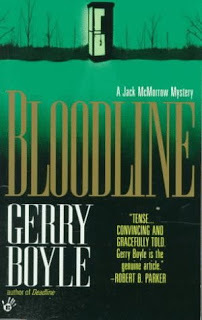 Jack McMorrow is a former New York Times reporter who opted to leave life in the fast lane for a totally different kind of experience in rural Maine. In the book that introduced him, Deadline, Jack had taken a job as editor of the Androscoggin Review, a small rural paper that's about as far from the Times as a newspaperman could get. He expected to find a relatively stress-free, laid-back existence with his girlfriend, Roxanne, but life in Androscoggin turned out to be anything but stress-free. Almost as soon as he arrived there, Jack became entangled in a nasty murder investigation that cost him his girlfriend and soured him on the county and its tiny newspaper.
Jack McMorrow is a former New York Times reporter who opted to leave life in the fast lane for a totally different kind of experience in rural Maine. In the book that introduced him, Deadline, Jack had taken a job as editor of the Androscoggin Review, a small rural paper that's about as far from the Times as a newspaperman could get. He expected to find a relatively stress-free, laid-back existence with his girlfriend, Roxanne, but life in Androscoggin turned out to be anything but stress-free. Almost as soon as he arrived there, Jack became entangled in a nasty murder investigation that cost him his girlfriend and soured him on the county and its tiny newspaper.As the second book in the series opens, we find that Jack has now moved to Prosperity, a poverty-stricken rural town in the middle-of-nowhere. He's living in a rented bat-infested house and spending his days wandering through the woods, watching birds, drinking a lot of beer and accomplishing nothing of any consequence. Roxanne is making a new life for herself out in Colorado, and the only people in Jack's life are Claire and Mary Varney, the couple that lives nearby.
Out of the blue, Jack gets a call from an old friend who's now editing a magazine. He'd like Jack to write a feature article about girls in rural Maine who are having babies way too early--kid having kids. The editor would like Jack to explore the consequences of that for the girls themselves, for their babies, and for the community at large.
Needing the money and having nothing better to do, Jack accepts the assignment. Someone steers him in the direction of a young woman named Missy Hewett, who was something of a star at the local high school. Missy was determined to build a better life for herself than that of her family, such as it was, and better than what most of her classmates could look forward too. Accordingly, she studied hard, avoided the temptations and pitfalls that would ultimately doom most of the other kids in her town, and set her sights on getting into college.
Then she got pregnant.
Rather than surrendering her dreams, Missy gave the baby up for adoption, believing that this was best both for the baby and for herself. She's now attending college in Portland, Maine, and seems to be making a success of herself. Jack decides to make her the focal point of his story. He interviews Missy, and begins interviewing other adults and young people in and around Prosperity. But somewhere along the line, he manages to stir up a reaction he didn't anticipate. All of a sudden, people are shooting out his windows, vandalizing his truck, and it's apparent that Jack has stumbled onto something that may be a lot larger than a simple magazine article.
This is another very good entry in the series, and again, Boyle particularly excels at describing the setting. One feels as if he or she is actually in rural Maine, walking though the woods with Jack McMorrow. The characters are expertly drawn and the plot is a good one. I'm looking forward to moving on to the third book in the series.
Published on March 05, 2019 14:59
February 28, 2019
P. I. Matthew Scudder Returns in A TIME TO SCATTER STONES
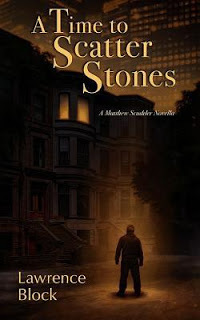 I yield to no one in my admiration for Lawrence Block, and I firmly believe that his Matthew Scudder series is the best P.I. series that anyone has ever done, including the earlier masters Dashiell Hammett and Raymond Chandler. Through the novels and the short stories that constitute this series, Block created an indelible portrait of New York City and of a haunted and flawed but ultimately unforgettable protagonist.
I yield to no one in my admiration for Lawrence Block, and I firmly believe that his Matthew Scudder series is the best P.I. series that anyone has ever done, including the earlier masters Dashiell Hammett and Raymond Chandler. Through the novels and the short stories that constitute this series, Block created an indelible portrait of New York City and of a haunted and flawed but ultimately unforgettable protagonist.Scudder last appeared eight years ago in a collection of short stories, The Night and the Music, and the elegiac final story, "One Last Night at Grogan's," seemed the perfect place to leave Scudder who was now happily married, well into his sixties and, sadly, no longer able to walk the mean streets of NYC in the way that he once had as a younger man.
Many of us hoped, however, that Block might still have at least one more Matthew Scudder novel in his future, preferably something along the lines of A Drop of the Hard Stuff, which was the last book to appear in the series, but in which Scudder looked back to recount the story of a case he had investigated years earlier as a much younger man. Thus, like many other die-hard fans of the series, I was elated to learn that Block would be releasing a new Matthew Scudder novella in early 2019.
I really wish he hadn't.
A Time to Scatter Stones is a relatively short novella principally featuring Scudder and his wife of many years, Elaine. Some of the other characters who populated the Scudder novels are mentioned in passing, but they are all long gone or MIA for the case that Scudder now accepts.
It begins when Elaine, who Matt first met when she was a young call girl, suddenly joins a support group for prostitutes--something like Matt's A.A. groups, but not exactly. Elaine has been out of the game for a good many years now and has to be approaching seventy herself. One might wonder why she would suddenly decide to join such a support group but, as it turns out, it serves to get the plot started.
One day after a meeting, Elaine brings home a young woman named Ellen, who has been working as a prostitute but who has decided to leave the profession. The problem is that one of her clients, who she knows only as "Paul," won't take no for an answer and insists on still seeing her. Elaine hopes that Matt might be able to find the guy and set him straight.
Matt accepts the challenge and works the problem the best way he can, given his age and his lack of contacts on the police force now. Meanwhile, there's an underlying subplot that I won't describe for fear of spoiling the story, but which really did not work for me, especially at the end of the book. As a result, I have really mixed emotions about this novella.
On the one hand, it's not a bad story and, in fact, it would have been a fine story for Block to have included somewhere in the middle of The Night and the Music. And if it would have been placed ahead of "One Last Night at Grogan's," I would have been perfectly fine with it. Reading it now, though somewhat spoils what I assumed would be my lasting final memory of Matthew Scudder, and unfortunately, once you've rung the bell, you can't unring it.
I'm giving this novella four stars because I think that's a fair assessment, and because that's certainly what I would have given it had I read it under other circumstances. But having bought a copy of the signed, special limited edition of the book, I'm going to tuck it away with my other treasures and leave it there. When I next work my way through the Matthew Scudder series, I will be stopping with "One Last Night at Grogans."
Published on February 28, 2019 15:17
February 27, 2019
A Novel By Oakley Hall Resurfaces After Sixty Years
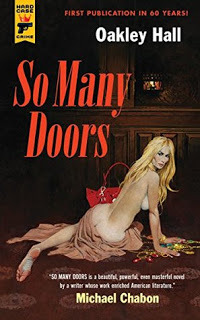 Oakley Hall's So many Doors, first published in 1950, seems an odd choice for the Hard Case Crime series because, while there is a murder in the book, this is not by any means a crime novel in the traditional sense. It immediately reminded me of Understudy for Death, by Charles Willeford, an excellent crime novelist. But that particular Willeford book was not a crime novel either. Originally published as Understudy for Love, it was really a psychological study of the characters who populated the novel. Hard Case Crime published it for the first time in over fifty years, changing the title and clearly implying that it was one of Willeford's crime novels.
Oakley Hall's So many Doors, first published in 1950, seems an odd choice for the Hard Case Crime series because, while there is a murder in the book, this is not by any means a crime novel in the traditional sense. It immediately reminded me of Understudy for Death, by Charles Willeford, an excellent crime novelist. But that particular Willeford book was not a crime novel either. Originally published as Understudy for Love, it was really a psychological study of the characters who populated the novel. Hard Case Crime published it for the first time in over fifty years, changing the title and clearly implying that it was one of Willeford's crime novels.Like the Willeford book, So Many Doors is another "long lost manuscript," that's being republished for the first time in fifty or sixty years, It opens with a prologue in which we find a man named Jack Ward in jail for a murder to which he has confessed. When his court-appointed lawyer arrives, Jack refuses to cooperate and kicks the guy out, claiming that he's anxious to be punished for his crime and simply wants to get it over with.
With that, the main story begins, told from the perspective of five different people, the last of which is Jack Ward. At the center of the story is a young woman named V, whom we first meet when she is seventeen. V. lives alone with her father on a struggling ranch near Bakersfield, California in the 1930s. Her mother has died years earlier and her father has done the best he can to raise V, but clearly he hasn't a clue as to how to go about it.
We we first meet V, she is a very attractive girl who is on the brink of becoming a woman that no man can resist. That includes an elderly and wealthy man named Denton who lives on the property that adjoins that of V's father. Denton likes to entertain V and gives her a valuable horse. He tells V's father that when the girl graduates from high school, he would like to pay for her college education. Ultimately, he would like to marry her. (Yeah; it's beyond creepy.)
Oddly V's father is not as upset about Denton's proposal as one might expect. It is the Depression; times are hard and V's prospects for the future are not all that great. Ultimately, marrying Denton might be a good thing for her, but it will have to be her choice.
Shortly thereafter, V's father hires a bulldozer operator, Jack Ward, to clear some stumps from his property. Jack is young, virile, and very attractive, and the reader immediately understands what's about to happen. The story unfolds from that point, through the eyes of people who are clearly captivated by V, for better or for worse.
This is, at heart, a story of star-crossed lovers that simply cannot end well. Reading the book is like watching some natural disaster unfold from which you simply can't avert your eyes. Parts of the book are fascinating, particularly the insights that it offers into lower-class life in the United States through the years of the Depression and World War II. The story is clearly dated, though, and Hall sometimes tries too hard to get into the heads of these characters.
In the end, then, I have mixed feelings about the book. I don't regret having spent the time it took to read it, but I really didn't enjoy it as much as I would have liked. Most of all, though, I wish that the folks at Hard Case Crime would get back to their original mission of publishing excellent crime novels and leave books like this one in the dusty bins of antiquity where they probably best belong.
Published on February 27, 2019 15:35
February 26, 2019
Detectives Donald Lam and Bertha Cool Take on a Case of Insurance Fraud
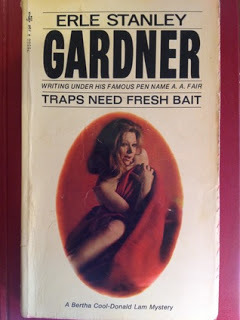 The second-to-the-last novel in A. A. Fair's (Erle Stanley Gardner's) Donald Lam and Bertha Cool series is not among the best. By the time this book appeared early in 1967, Gardner was approaching the end of a long and very productive career, and it would appear that he had run out of fresh ideas.
The second-to-the-last novel in A. A. Fair's (Erle Stanley Gardner's) Donald Lam and Bertha Cool series is not among the best. By the time this book appeared early in 1967, Gardner was approaching the end of a long and very productive career, and it would appear that he had run out of fresh ideas.Anyone who has read several of these novels will know the basic formula: a potential client will appear at the offices of Cool and Lam, looking perfectly respectable and allegedly representing some big business. Bertha will take the client at face value and insist that this is finally the firm's opportunity to take on respectable, prosperous clients who can provide healthy fees without all the risks of the usual cases that the firm takes. Donald, as always, will be on guard and will generally see through the story told by the new client.
In this case, a man appears with a crisp, embossed business card, claiming to be a vice president of a major insurance agency. He shows Bertha and Donald a newspaper classified ad in which someone is looking for a witness to an automobile accident. The client says he fears that the ad is really an effort to suborn perjury in the case and then "accidentally" lets it slip that he's actually representing a consortium of insurance companies who are having problems in this regard.
Naturally, that sets Bertha's heart a flutter, and she and Donald take the case. Donald determines almost immediately, of course, that the new client is not on the up and up and that serious mischief is afoot. And naturally, of course, he and by extension the firm, will very quickly be up to their necks in trouble again. As always, Donald will have to act quickly and intelligently to save the firm's bacon, if it's not already too late.
This is not a bad book, but people who have read a lot of the entries in this series will realize that they have seen all this before and that it's probably not a bad thing that the series has almost run its course.
Published on February 26, 2019 14:43
February 24, 2019
An Excellent Debut Novel from Jane Harper
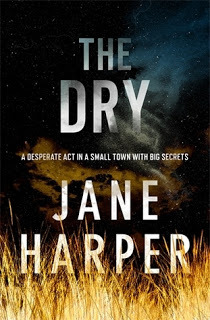 Twenty years ago, Aaron Falk and his father were driven out of the small town in Australia where they lived. Now, Luke Hadler, Aaron's best friend from his childhood, is dead, along with Hadler's wife and young son. Falk, now a federal agent who investigates financial crimes, is finally pulled back home to attend the funeral after getting a cryptic message from Hadler's father.
Twenty years ago, Aaron Falk and his father were driven out of the small town in Australia where they lived. Now, Luke Hadler, Aaron's best friend from his childhood, is dead, along with Hadler's wife and young son. Falk, now a federal agent who investigates financial crimes, is finally pulled back home to attend the funeral after getting a cryptic message from Hadler's father.The community is in the midst of the worst drought in decades, and everyone is on edge. It would appear that Luke, a farmer, finally snapped and murdered his wife and son with a shotgun before turning the weapon on himself. The case appears cut and dried, but Hadler's parents plead with Falk to at least look at the case. Aaron agrees to stay a couple of extra days, but at a price to himself. It's clear that the local animosity that drove him and his father out of town has not abated to any degree, and he finds himself the victim of a great deal of hostility.
As the story unfolds, we learn a great deal about this small community and about the events years earlier that would ultimately cause so much grief for so many people. Harper skillfully follows the stories past and present, and the tension rises to a great climax. She is particularly good at describing the setting, and one can practically feel the heat and the desperation of a farm community on edge because of the murders and because of the drought that may well seal the community's fate. This is a very good debut novel.
Published on February 24, 2019 14:14
February 20, 2019
The Classic Mystery Novel from Agatha Christie
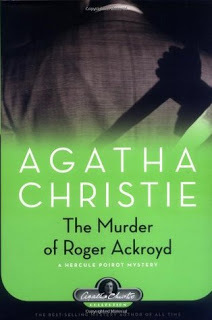 Originally published in 1926, The Murder of Roger Ackroydremains a classic of crime fiction. Written early in her career, this was the third novel to feature the Belgian detective Hercule Poirot. (Goodreads list this as #4 in the series, but most other sources have it as the third.)
Originally published in 1926, The Murder of Roger Ackroydremains a classic of crime fiction. Written early in her career, this was the third novel to feature the Belgian detective Hercule Poirot. (Goodreads list this as #4 in the series, but most other sources have it as the third.)The book takes place in the small English village of King's Abbot, and opens with the death of a widow named Mrs. Ferrars. Rumors quickly spread among the villagers that she has committed suicide and that she had earlier murdered her husband by poisoning him. Following the death of her husband, she has also been rumored to have been carrying on a secret relationship with Roger Ackroyd, the wealthiest man in King's Abbot.
That same night, Ackroyd is found murdered, stabbed to death in his study. Ackroyd's family and staff had been instructed that he did not wish to be disturbed that evening and when his body was discovered about ten o'clock that night, the door to his study was locked from the inside. A study window was found open, and muddy boot prints suggest that someone entered and left the study by climbing through the window.
We learn all of this from the story's narrator, Dr. James Sheppard. the quiet country doctor who attended Mrs. Ferrars and who is a close friend of Ackroyd's. Ackroyd is distraught by the woman's death and asks Sheppard to visit him that evening. Ackroyd is burdened by a terrible secret that he reveals to the doctor. In fact, Mrs. Ferrars hadpoisoned her abusive husband and had confessed her secret to Ackroyd the day of her death. Ackroyd now fears that the woman may have killed herself because of his reaction to her confession. Sheppard counsels Ackroyd and then leaves the house a little after 9:00. A little less than an hour later, Sheppard gets a phone call which sends him racing back to Ackroyd's house. He and the butler break down the study door and find Ackroyd dead.
There are any number of potential suspects, including houseguests, family members and the large household staff. Several of these people are having money problems; most of them are in Ackroyd's will and will be financially better off now that he's gone.
The local constable is clearly not up to the task of sorting this out and finding the killer. Fortunately, the renowned detective, Hercule Poirot, has recently retired and is living quietly in King's Abbot, growing vegetable marrow. He agrees to be pressed into service and begins an investigation with the good Dr. Sheppard at his side, chronicling the investigation in the manner of Dr. Watson, or of Poirot's old friend, Hastings.
This is, basically, the typical English manor house mystery raised to classic status by the brilliant design of the plot. Even early in her career, Christie was a master of setting a book like this in motion, giving the reader all of the necessary clues, and then daring them to divine the solution before Hercule Poirot could reveal all. If you're only ever going to read one novel by Agatha Christie, it should be this one, and even if you're not a fan of this sort of mystery, it's one that any fan of crime fiction should certainly have read.
Published on February 20, 2019 15:24
February 19, 2019
Kidnapping Specialist Andrew Douglas Gets More Than He Bargained for in THE DANGER, by Dick Francis
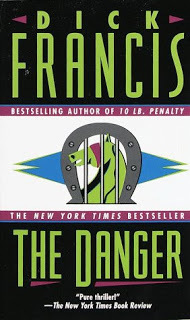 To my mind, The Danger is among the best of the novels by Dick Francis. While most of the others are set firmly in the world of horseracing, this is one of his books where the world of horseracing is somewhat tangential to the rest of the book.
To my mind, The Danger is among the best of the novels by Dick Francis. While most of the others are set firmly in the world of horseracing, this is one of his books where the world of horseracing is somewhat tangential to the rest of the book.The protagonist is Andrew Douglas, a partner in a firm called Liberty Market, Ltd. The firm specializes in handling high-stakes kidnapping cases. They attempt to ensure that the kidnapped victim is safely recovered. With that accomplished, they also work to recover the ransom and see that the kidnappers are captured and punished. Andrew and the other partners in the firm prefer to keep a low profile and work behind the scenes in concert with the police and the victim's family, and often the kidnappers don't even realize that Liberty Market or a firm like it has been involved in the case.
When a hugely popular Italian jockey named Alessia Cenci is kidnapped, her family immediately calls upon Liberty Market, and Andrew races to Bologna to take charge of the situation on behalf of the family. It's a very delicate and demanding task. In a case like this, Andrew must keep the family focused on taking the proper steps to ensure the safe return of their loved one. Even more delicate is the relationship with the local police. Sometimes the police welcome the assistance of Liberty Market, but in other cases, they are driven by ego and view the Liberty Market representatives as interlopers and competitors. Naturally, this will always complicate the situation.
Watching Andre Douglas at work is fascinating, and the dance he conducts between the family, the kidnappers and the police is very entertaining. Apparently there really are firms like Liberty Market that specialize in this sort of thing, and reading the book, one learns a great deal about the subject of kidnapping and the responses the crime elicits.
As Andrew works the case, things become increasingly complicated, but it's hard to say much more about the book without giving too much away, and to my mind, the blurb on the cover gives away way too much. Suffice it to say that the villain in this book is also something of a departure of the usual stock villain that Francis almost always gives us. That too makes this book stand out above many of his others. All in all, a very fun read.
Published on February 19, 2019 14:31



